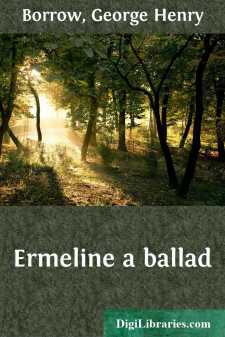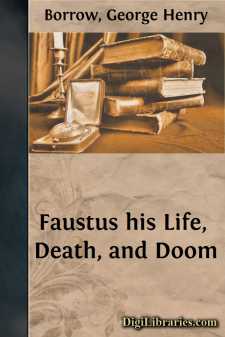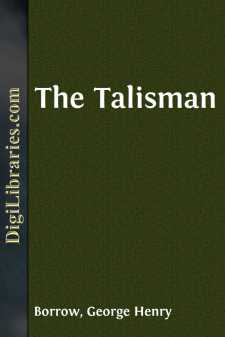Categories
- Antiques & Collectibles 13
- Architecture 36
- Art 48
- Bibles 22
- Biography & Autobiography 813
- Body, Mind & Spirit 142
- Business & Economics 28
- Children's Books 13
- Children's Fiction 10
- Computers 4
- Cooking 94
- Crafts & Hobbies 4
- Drama 346
- Education 46
- Family & Relationships 57
- Fiction 11828
- Games 19
- Gardening 17
- Health & Fitness 34
- History 1377
- House & Home 1
- Humor 147
- Juvenile Fiction 1873
- Juvenile Nonfiction 202
- Language Arts & Disciplines 88
- Law 16
- Literary Collections 686
- Literary Criticism 179
- Mathematics 13
- Medical 41
- Music 40
- Nature 179
- Non-Classifiable 1768
- Performing Arts 7
- Periodicals 1453
- Philosophy 64
- Photography 2
- Poetry 896
- Political Science 203
- Psychology 42
- Reference 154
- Religion 513
- Science 126
- Self-Help 84
- Social Science 81
- Sports & Recreation 34
- Study Aids 3
- Technology & Engineering 59
- Transportation 23
- Travel 463
- True Crime 29
George Henry Borrow
George Henry Borrow (1803-1881) was an English author known for his travel literature and novels, most notably "The Bible in Spain" and "Lavengro." His works often drew on his extensive travels across Europe and his deep interest in the Romani people and their culture. Borrow's unique storytelling combined his personal adventures with rich cultural and linguistic observations, making his writings a significant contribution to 19th-century literature.
Author's Books:
Sort by:
INTRODUCTION Early in the present year Mr. Thos. J. Wise discovered among the miscellaneous MSS. of Borrow a fragment which proved to be part of a version of Oehlenschläger’s Gold Horns. His attention being drawn to the fact, hitherto unknown, that Borrow had translated this famous poem, he sought for, and presently found, a complete MS. of the poem, and from this copy the present text has been...
more...
ACT THE FIRST. BALDER and THOR are seated upon stones at some distance from each other. Both are armed—THOR with his hammer, and BALDER with spear and sword. BALDER. Land whose proud and rocky bosomBraves the sky continually! THOR. Where should strength and valour blossom,Land of rocks, if not in thee? BALDER. Odin’s shafts of ruddy levinBack from thy hard sides are driven;Never sun thy...
more...
TORD OF HAFSBOROUGH It was Tord of Hafsborough, O’er the verdant wold would ride,And there he lost his hammer of gold, ’Twas lost for so long a tide. It was Tord of Hafsborough, His brother he addressed:“Thou shalt away to the Norland hills, My hammer be thy quest.” It was Lokke Leyemand, A feather robe o’er him drew;And away to the Norland mountains high O’er the...
more...
MARSK STIG’S DAUGHTERS Two daughters fair the Marshal had,O grievous was their fate and sad. The eldest she took her sister’s handAnd away they went to Sweden’s land. Home from the Stevn King Byrgye rode;Up to him Marsk Stig’s daughters trode. “What women ye who beset my gate?What brings ye hither at eve so late?” “Daughters of Stig, the Marshal brave,So earnestly thee for help we...
more...
My Dearest Carreta, I arrived this day at Venice, and though I am exceedingly tired I hasten to write a line to inform you of my well-being. I am now making for home as fast as possible, and I have now nothing to detain me. Since I wrote to you last I have been again in quarantine for two days and a half at Trieste, but I am glad to say that I shall no longer be detained on that account. I was...
more...
INTRODUCTION ‘Lavengro’ and ‘The Romany Rye’ are one book, though the former was published in 1851 and the latter not until 1857. After a slumber of six years the dingle re-awakes to life, Lavengro’s hammer shatters the stillness, and the blaze of his forge again lights up its shadows, while all the strange persons of the drama take up their parts at the point where the curtain had been so...
more...
ERMELINE. With lance upraised so haughtily Sir Thunye rides from Alsey town;On land and main he was, I ween, A daring knight of high renown. Sir Thunye rides in good green wood, He fain will chase the nimble hare;And there he meeteth the Dwarf’s daughter, All with her band of maidens fair. Sir Thunye rides in good green wood, To chase the nimble hart and hind;And there he meets...
more...
Faustus, having long struggled with the shadows of Theology, the bubbles of Metaphysics, and the ignes-fatui of Morality, without being able to bring his mind to a firm conviction, at length cast himself into the dark fields of Magic, in the hope of forcing from Nature what she had so obstinately withheld from him. His first attainment was the remarkable invention of Printing; but his second was...
more...
THE TALISMAN From the Russian of Pushkin. Where fierce the surge with awful bellowDoth ever lash the rocky wall;And where the moon most brightly mellowDost beam when mists of evening fall;Where midst his harem’s countless blissesThe Moslem spends his vital span,A Sorceress there with gentle kissesPresented me a Talisman. And said: until thy latest minutePreserve, preserve my Talisman;A secret power...
more...
THE VERNER RAVEN The Raven he flies in the evening tide, He in day dares not intrude;Whoever is born to have evil luck In vain may seek for good. Lustily flies the Verner Raven, High o’er the wall he’s flown,For he was aware that Irmindlin fair Sate in her bower alone. He southward flew, and he northward flew, He flew high up in the cloud;And he beheld May Irmindlin Who...
more...











